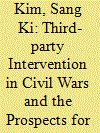| Srl | Item |
| 1 |
ID:
151711


|
|
|
|
|
| Summary/Abstract |
The empirical international conflict literature has given much recent attention to interstate armed force’s impact on human well-being. While empirical research has advanced our understanding of the phenomenon considerably, we argue that one conclusion that many studies have reached is preliminary. Some recent research contends that only full-scale war, and not force short of war, has a discernable impact on human welfare or physical quality of life (PQOL). We develop theory on one type of force short of war, large-scale foreign military intervention (FMI), and its potential effects on PQOL. Using interrupted time series and panel corrected standard error methodologies, we find that from 1960 to 2005 large-scale FMI had a statistically and substantively significant impact on the PQOL of populations in 106 developing countries. The specific effect that this type of armed force has depended in large part on the regime type of the target country.
|
|
|
|
|
|
|
|
|
|
|
|
|
|
|
|
| 2 |
ID:
152121


|
|
|
|
|
| Summary/Abstract |
How does third-party intervention in civil war influence citizens’ physical quality of life (QOL) after civil war? I find that the effects of intervention on postwar QOL depend on its type, unilateral intervention, and United Nations (UN) intervention. Unilateral interveners seeking self-interest tend to impede the improvement in postwar QOL particularly in terms of life expectancy and infant mortality rate. They are likely to do so through producing their protégé’s military victory or negotiated settlement, expanding their influence on postwar government, and resultingly forming a government less responsive to citizens’ hardship and reducing resources available for welfare. UN intervention on humanitarian grounds tends to promote postwar social development particularly in the fields of public health, although it has no significant effect on literacy rate. It is likely to do so by increasing resources available for postwar reconstruction, even though it goes where postwar social development is relatively difficult.
|
|
|
|
|
|
|
|
|
|
|
|
|
|
|
|